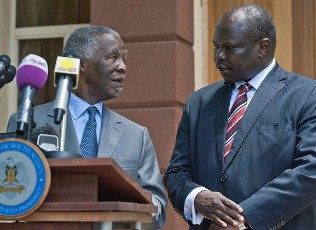Kiir holds talks with Mbeki over post-independence disputes with Sudan
May 21, 2012 (JUBA) – The head of the African Union team mediating between Sudan and South Sudan over a host of security, economic and political issues that arose from South Sudan’s independence last year, said a date for the resumption of negotiations could be determined within the week.

The pan-African body’s timetable was endorsed by a United Nations Security Council (UNSC) resolution in early May which threatened both sides with non-military sanctions if they are found in non-compliance with the decision.
Mbeki did not give a specific date on which his panel would propose to bring the two sides back to the negotiating table.
Juba has welcomed the roadmap without conditions and the UN has verified the withdrawal of its forces from the key contested area of Abyei in accordance with the UNSC resolution. Khartoum’s reaction has been mixed treating the resolution with caution by insisting that security matters must be a priority in the hope that this will force South Sudan to end its alleged backing of rebels in Sudanese territory.
Talks were suspended following a border conflict of over Heglig, an oil-producing area inside Sudan’s South Kordofan state which placed the two nations on the verge of a return to all-out war.
The 2 May UNSC resolution demanded the two sides cease hostilities immediately and to resume negotiations particularly on oil, citizenship, borders and Abyei.
Speaking to reporters at a press briefing at the country’s presidential palace, known as J1, Mbeki described the meeting with president Kiir as “positive” and said the government of South Sudan was committed to respecting a peaceful process to resolve the disputes.
Mbeki has been criticised by some officials in Juba for being too close to Khartoum and not being an even handed mediator. South Sudan’s Information Minister, Barnaba Marial Benjamin and others have suggested that East African regional
body IGAD should play a wider role.
However, Mbeki said that Kiir had assured him that South Sudan was committed to the African Union-mediated process and respecting the resolutions of the United Nations aimed at bringing peace and stability to the citizens of both countries.
“This is a positive indication that South Sudan is committed to producing the positive results required at the end of the talks”, Mbeki told reporters.
Mbeki’s visit followed a trip to Khartoum where he held similar talks with Sudanese president Omer Hassan al-Bashir and the leadership of Sudan’s ruling National Congress Party (NCP).
The former South African president also held a joint meeting with South Sudan’s lead negotiating panel, which is chaired by the Secretary General of the country’s governing Sudan People’s Liberation Movement (SPLM), Pagan Amum.
The meeting, which was also attended by cabinet ministers, discussed the implementation of the AU proposal and UNSC resolution 2046.
At the meeting Amum confirmed Juba’s readiness to resume talks over disputed issues.
Speaking to the press shortly after participating in the meeting, South Sudan’s lead negotiator, Pagan Amum, said his team was ready to resume talks any time anywhere with “new spirit and cooperation” in order to reach a lasting settlement.
“We have been ready to resume talks. In fact I want to make it clear that we have never left the negotiation table. It was the delegation of the Sudan which left the negotiating venue”, said Amum.
He expressed hope that the Sudanese delegation comes with an “open heart” to the next round of talks.
But the SPLM SG also appeared skeptical of Khartoum’s desire to negotiate.
Amum accused Bashir of trying “impose preconditions” on the talks, a position which he said was a violation of the UNSC resolution.
“It seems Khartoum is not ready to come [to the talks] … There is an implied refusal by Khartoum to commit to the negotiations without pre-conditions,” he said.
(ST)
